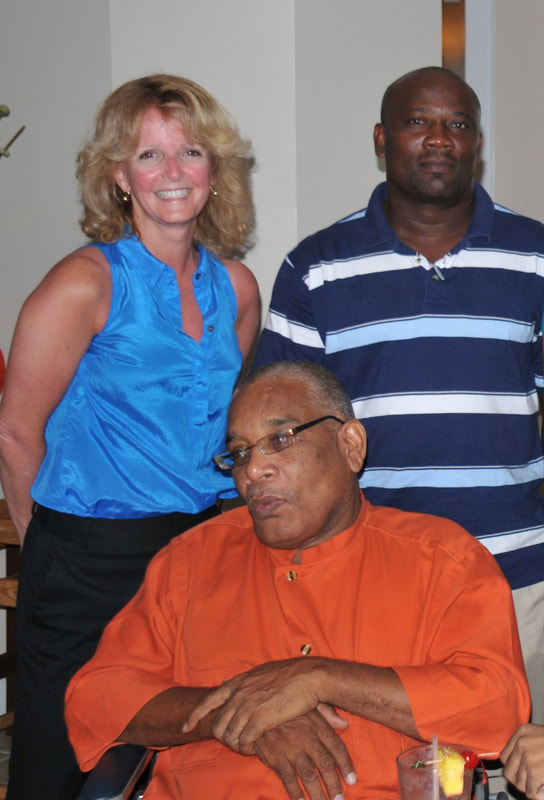|
Leemar Yarde has hemophilia B with an inhibitor, and he lives on the tropical island of Barbados. He is one of six people with hemophilia in his family, but he's the only one with an inhibitor—in fact, the only one on the island with one. So he often meets new challenges. Growing up in a family with two older, experienced relatives with hemophilia has its benefits, but here's a little backstory. Barbados is a developing country. The medical care there is free, and that is commendable, because many people can’t afford medical care. However, the downside is that due to the cost of some medicine, the government can only afford either generic or very limited supplies. Budgets are often allocated to life- threatening illnesses, and the government doesn’t view hemophilia as one. As a result, very limited amounts of clotting factor are imported for both types of hemophilia, and none for inhibitors. Barbados doesn’t have a hemophilia treatment center (HTC) or even a medical facility dedicated solely to hemophilia. What we do have is a hematology center that caters to various blood disorders. That center has a handful of experienced hematologists; one or two have dealt with inhibitors in different countries. Sadly, a hematologist can only work with the tools available. Leemar remembers having to wait from 8 am until 12 pm to see the doctor, then being told that the hospital had no factor at that time. Still, in Barbados, their fortunate because some of the neighboring Caribbean islands can’t afford any clotting factor. So for Leemar, at one point all hope seemed lost...until he met “her.” Leemar's inhibitors surfaced when he was in his early 20s and at a difficult period in
his life. In his late teens, he began suffering from frequent right knee bleeds. In time, it became clear that knee replacement surgery was inevitable. But why wasn’t the factor bringing some relief? Maybe we just needed to infuse more at a single time. So he saw an orthopedic surgeon, who recommended getting tested for inhibitors. Barbados doesn’t have the ability to conduct such a test, so blood samples had to be sent to the US for testing. About a month later, the results came back: there was an inhibitor. So the knee replacement was put on hold: his family couldn’t afford the amount of factor needed to attempt to tolerize, plus the high cost of using bypassing agents. As a result, Leemar went a year without treatment. During that time, he was using crutches and putting all his weight on the other good knee, so he lost the use of that knee as well. Using crutches also damaged his right shoulder. His family reached out to various organizations worldwide, often being turned down. His hematologist, trying her best and with the limited resources allotted to her, managed to procure a sample donation of FEIBA from Central America. Remember the “her” Leemar mentioned? She was Laurie Kelley. Coming to Barbados in response to a request from a mother of a child with hemophilia (unrelated to me), Laurie and her wonderful assistant Zoraida wanted to meet most, if not all, the people with hemophilia on the island. That’s when we met, and Laurie offered to help me in my times of need. Ever since then, Project SHARE has supplied NovoSeven and FEIBA when possible. Words cannot express how grateful Leemar, his family, and hematologist are for this constant support. Sadly, though, he has lost his ability to walk, and he is dependent on his family and a wheelchair for mobility. It has cost him a certain quality of life, and the dreams he had growing up. Adding to these difficulties, Barbados does not cater to physically challenged people. Society there still tends to look down on the disabled, but people eventually learn to live with it. Leemar tried to find some joy despite the hardship, and fortunately for him, he comes from a very large family with no shortage of love and care. His parents work to make his life as comfortable and pain-free as possible, and for that he is eternally grateful. In Barbados rationing factor is a norm. Often the forgo dipping into their supply at home, because the hospital is out of factor and doesn’t know when it will acquire more. This means that if a bleed isn’t too bad (on a scale of 1–10, below a 7), patients will have to endure pain and suffering, at the cost of a little joint damage, for the sake of not being completely out of factor. In the Caribbean they will have endured all types of pain and know when a bleed is a bad one, a very bad one, or a “killer.” With that knowledge and experience, they know when their hand is forced and they have no choice but to use up their limited supply of factor. Leemar's two uncles grew up at a time before factor was introduced in Barbados. Their wealth of knowledge has been beneficial not only to their family, but to all others with hemophilia on the island. Recently, a Barbados Hemophilia Association was established there, to advocate and bring awareness to the public. One achievement it’s working toward is the establishment of a dedicated HTC here in Barbados. Next, they'll need to work on a supply of factor for all. Leemar feels that not much can be done for him, but for the younger ones with hemophilia, things can change. To learn more about Laurie Kelley and the work she does to help families in developing countries visit www.saveonelife.ne |
Hope Charities
|
Live Chat Support
×
Connecting

You:
::content::
::agent_name::
::content::
::content::
::content::

 RSS Feed
RSS Feed